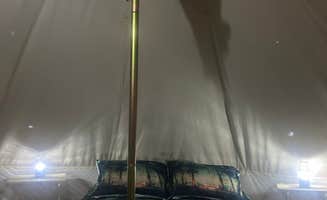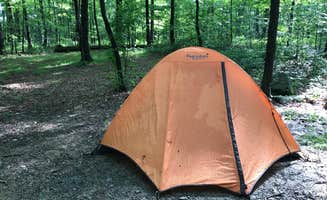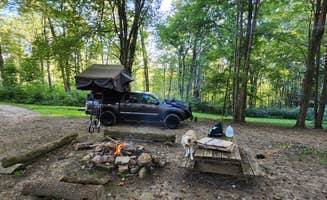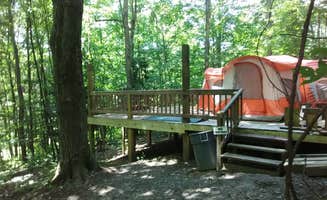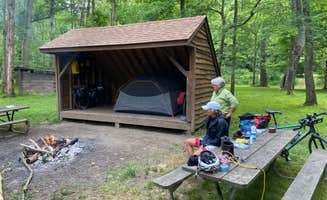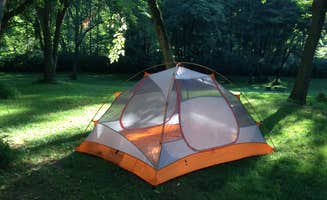Tent campsites near Parkhill, Pennsylvania offer diverse camping experiences beyond the traditional campgrounds. The region sits within the Allegheny Mountains with elevations ranging from 1,200 to 2,800 feet, creating varied terrain for campers. Water access remains a significant feature at many sites, with several waterways supporting primitive camping along their shores.
What to do
Boat-access camping only: Nancy's Boat To Shore Campground provides a unique camping experience requiring watercraft to reach. "This campground is accessed by boat only. But it has a maintenance road and is patrolled by college kids with summer jobs. Follow the rules and you will have a wonderful time," notes John H. These sites are positioned in higher boat traffic areas where advance booking is recommended.
Explore historical landmarks: Sites near Maple Festival Park provide access to regional historical attractions. "Just be sure to secure your food overnight - if you don't, the raccoons will make quick work of it!" warns Sarah Q. The campground connects to the Great Allegheny Passage trail system, facilitating bicycle exploration of historical coal mining towns.
Stargazing opportunities: The lack of light pollution makes astronomical observation exceptional at STAR LEE FARM. "Place was very pretty and secluded... There's a huge field to star gaze as well as taking pictures," reports Tiana S. The farm's three dedicated tent sites provide dark sky conditions optimal for meteor shower viewing during summer months.
What campers like
Wildlife encounters: Multiple campsites report consistent wildlife sightings beyond the typical deer and squirrels. Richard C. from Mountain View Camps shares that visitors might "even see an albino fawn" while exploring nearby game lands. These wilderness interactions occur most frequently during early morning and dusk periods.
Riverside camping: The Youghiogheny River corridor offers water-adjacent camping with natural sound barriers. "Free bike-in camp site with water access along the Youghiogheny River. Access from the Allegheny Gap trail," explains Lauren C. about Dravo's Landing. River sites typically feature natural swimming areas but require careful site selection during spring high water periods.
Trail connectivity: Many campsites serve as connection points to extensive trail networks. "We've camped in a lot of places, from remote islands, alpine glaciers, to downtown parks, and yet none have displayed the unique mix of this quaint little corner of Meyersdale, PA," notes Shari G. about The GAP Trail Campground. Trail-adjacent sites often fill quickly during peak biking season from June through September.
What you should know
Weather considerations: The mountain terrain creates microclimates with temperature variations between valleys and ridges. "The bathhouse could use a renovation. It felt old and kind of dirty," notes Ashleigh M. about facilities at Laurel Ridge State Park Campground. Higher elevation sites often experience overnight temperatures 10-15 degrees cooler than valley locations.
Train noise: Several campgrounds near the Great Allegheny Passage experience railroad noise. "There are quite a few trains thru town. Very peaceful place. I highly recommend," explains Mark G. about railway activity near Maple Festival Park. Most campers report acclimating to train schedules after the first night.
Water treatment: Sources at primitive sites typically require purification. "The camping areas are supposed to have firewood and water, but the wood is often punky, and the water needs to be treated," Brian S. observes about Laurel Ridge facilities. Campers should pack filtration systems even when water sources are advertised.
Tips for camping with families
Apiary education opportunities: Certain sites offer unique educational experiences for children. "If you're a bee enthusiast they grow their own honey in the property and you're more than welcome to walk around and look at all the boxes," mentions Tiana S. about STAR LEE FARM. These supervised activities provide hands-on science learning during warmer months.
Cemetery exploration: Historical burial grounds near camping areas create educational opportunities. Lauren C. notes about Dravo's Landing Campground, "It's close to an old cemetery which is useful in telling ghost stories around the campfire." These sites offer cultural and historical context suitable for school-aged children.
Site leveling challenges: Terrain variations create tent placement difficulties at some locations. Christopher M. notes about Indian Creek Camplands, "Not the most level areas but good clean and quiet campsites." Families should pack additional ground padding for comfort and stability on uneven terrain.
Tips from RVers
Limited electric hookups: Most tent-focused campgrounds offer minimal electrical service. "There's no electricity there but the owner is working on that but there is power in the shower house," explains Tiana S. about facilities at STAR LEE FARM. RVs requiring consistent power should consider generator restrictions before booking.
Accessibility constraints: Narrow access roads limit larger recreational vehicles at most primitive sites. "Service is a little sketch but it's perfect for those who want to completely escape the business of modern world," notes Tiana S. regarding connectivity issues. Most sites accommodate vehicles under 25 feet but struggle with larger configurations.
Shower facilities vary widely: Bathhouse quality differs significantly between campgrounds. Shari G. describes The GAP Trail Campground as having "the outdoor shower/toilet block is such a divine sight, it makes you crave one whether you're stinky or not." RVers should verify facility conditions before relying on campground showers.


